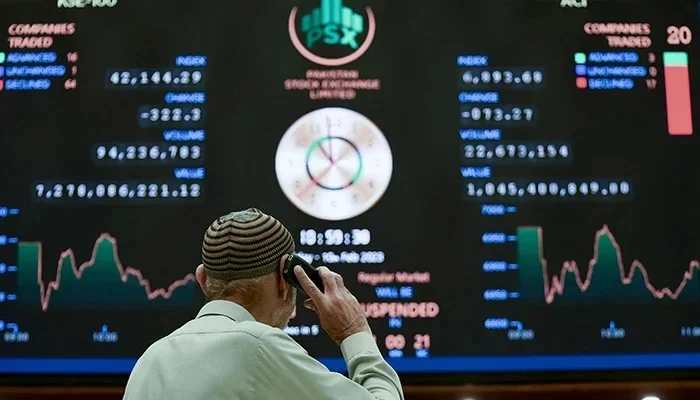Stocks concluded Friday’s trading session in positive territory, recovering from significant early losses in a highly volatile session, as investor sentiment demonstrated resilience amidst ongoing geopolitical tensions and economic uncertainty.
The Pakistan Stock Exchange (PSX) benchmark KSE-100 Index experienced a gain of 449.53 points, or 0.39%, to close at 115,469.34. The trading volume reached 213.6 million shares, with a total market value exceeding Rs20 billion.
During the initial trading hours, the index reached a high of 115,844.88 points, briefly showing an increase of 825.07 points or 0.72% compared to the previous closing figure of 115,019.81. However, this upward momentum could not be sustained, and the index subsequently fell to an intraday low of 113,716.60, marking a decline of 1,303.21 points or -1.13%.
AAH Soomro, an independent investment and economic analyst, commented, “The apprehension is growing as tensions between India and Pakistan have escalated following attacks on Indian tourists.”
He further stated, “Investors are likely to remain cautious for a few weeks or until greater clarity emerges regarding the risk of escalation.”
The market continues to exhibit volatility in the aftermath of New Delhi’s response to the deadly attack in Indian Illegally Occupied Jammu and Kashmir (IIOJK), which included the suspension of a bilateral water treaty, severance of diplomatic ties, and the imposition of travel restrictions. Pakistan has responded by closing its airspace to Indian flights and expelling Indian diplomats.
Concurrently with geopolitical strains, the State Bank of Pakistan (SBP) identified protectionist global policies as an increasing risk in its Financial Stability Review 2024.
The SBP cautioned that new US tariffs and a shift in global trade dynamics could negatively impact economic growth and complicate financial conditions for emerging markets such as Pakistan.
In addition, the SBP’s weekly data revealed a $367 million decrease in foreign exchange reserves, which now stand at $10.21 billion. The central bank attributed this reduction to debt repayments and limited financial inflows. Total reserves, including those held by commercial banks, decreased to $15.436 billion.
Despite a record current account surplus of $1.2 billion in March, the country experienced a deficit of $97 million in February. The SBP emphasized that sustaining economic recovery is contingent upon continued progress in structural reforms and the strengthening of external buffers.
As the week concludes, investor caution remains heightened, with markets closely monitoring diplomatic developments and indicators of fiscal and monetary stability.



